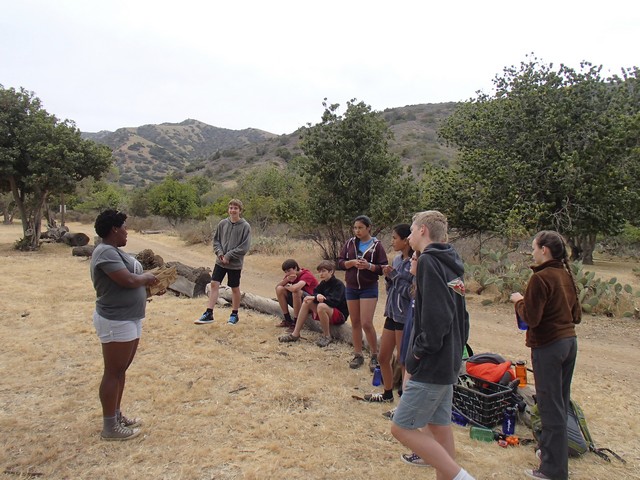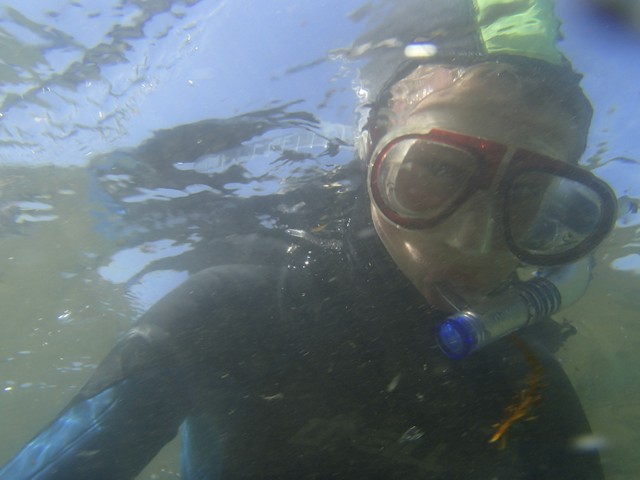 The ninth grade class recently returned from a Learning Journey they call “Flow with Water” or Yeyeco Ica Atl in the language of the Pimungan people, the first human occupants of California’s Santa Catalina Island. The class went to Catalina Island off the coast of Long Beach and joined the Catalina Environmental Leadership Program (CELP) for a week of outdoor field studies, leadership challenges, and personal growth.
The ninth grade class recently returned from a Learning Journey they call “Flow with Water” or Yeyeco Ica Atl in the language of the Pimungan people, the first human occupants of California’s Santa Catalina Island. The class went to Catalina Island off the coast of Long Beach and joined the Catalina Environmental Leadership Program (CELP) for a week of outdoor field studies, leadership challenges, and personal growth.
Students were busy from early morning until bedtime with an active program that included four snorkeling trips to the kelp forest in a pristine environment, kayaking, hiking, a ropes course, climbing wall, evening astronomy and natural history programs; and a live microscope lab. CELP prides itself on taking students out of their comfort zone and connecting the sustainable practices on land with the unspoiled kelp forest that looks very different from the marine environments by mainland California.
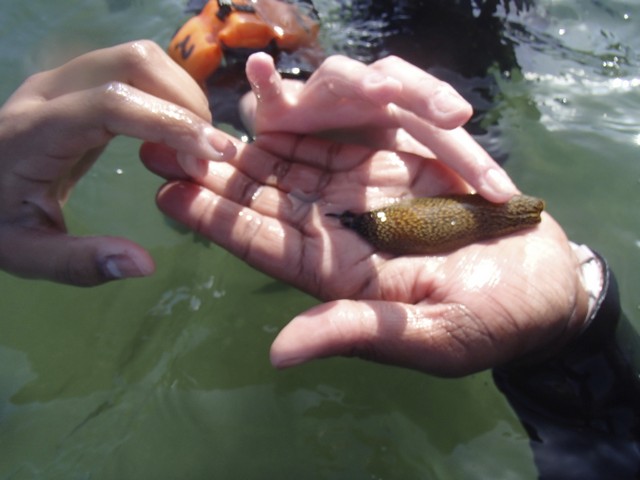 “For me, this has mentally been one of the most challenging trips I’ve done, because [trip leaders] have pushed us so hard to step out of our comfort zone and do things that I personally am not comfortable with,” commented freshman Cameron Bess.
“For me, this has mentally been one of the most challenging trips I’ve done, because [trip leaders] have pushed us so hard to step out of our comfort zone and do things that I personally am not comfortable with,” commented freshman Cameron Bess.
“CELP takes students out of their comfort zone by pushing them on the climbing wall, ropes course, and in the water, explains trip leader and MMS science teacher Lisa Catterall. “They show students a kelp forest that looks like the coast of California would look without any pollution or human effects, and they show students how to operate their camp in a 100% sustainable, waste-free fashion. Students have to compost and use the water bottle they receive on the first day so that there is literally no trash whatsoever. They provide large bottles of sunscreen and soap to use around camp facilities that have no effect on ocean chemistry. Because the camp is the only settlement in the watershed before the ocean, the students can see that there is a direct connection between living waste (and pollution) free and a healthy coast.”
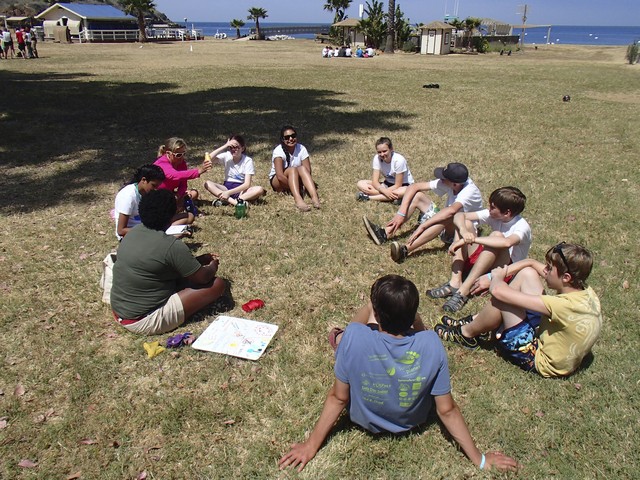 All of the MMS students and teacher chaperones participated in every activity, including a nighttime snorkel in an area patrolled by harmless leopard sharks.
All of the MMS students and teacher chaperones participated in every activity, including a nighttime snorkel in an area patrolled by harmless leopard sharks.
“The highlight of this trip for me was the Bioluminescence,” says Catterall. “I have never before seen such bright lights in the ocean; jellyfish were flashing like light bulbs and the plankton twinkled like stars. My favorite moment was a late night spent with my students hanging off the main pier and stirring the light up with an oar, and just marveling at the mystery of biology.”
“We covered a lot on the trip. I did new things and saw new things. On our second snorkel I started paying a lot more attention because I wasn’t as scared of the ‘unknown’,” said Elise Slater. “I learned about small marine animals and their niches, and even saw an octopus!”
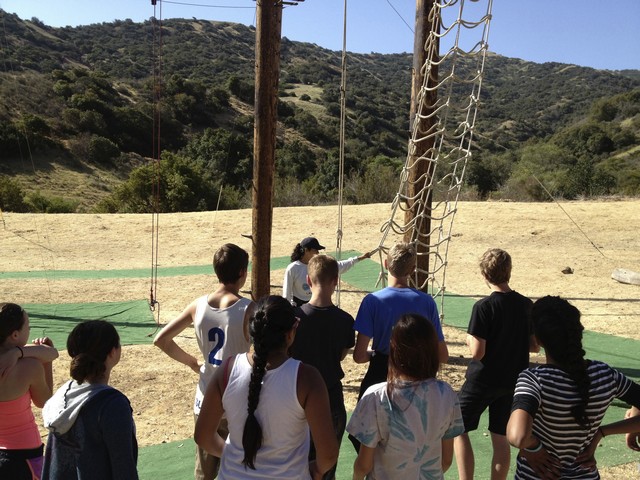 With the exception of the microscope lab program, this five-day marine science ‘intensive’ was planned as a complete ‘technology break’ for the students, who agreed to forgo cell phones, iPods, tv and videogames while on Catalina. Some students expressed surprise at how this affected them.
With the exception of the microscope lab program, this five-day marine science ‘intensive’ was planned as a complete ‘technology break’ for the students, who agreed to forgo cell phones, iPods, tv and videogames while on Catalina. Some students expressed surprise at how this affected them.
“I found that I slept so well each night,” shared student Holden Smith. “I attribute this to not looking at any screens.”
“The project was a great opportunity for our class to become more knowledgeable and gain a greater appreciation for marine biology by being involved in hands-on learning,” shared the students in a written reflection. “We gained experience in organization, fundraising, cooperation, and travelling as a group. This experience has helped to prepare us for future learning journeys. Travelling together as a school group allowed us to experience our ecosystem in a deeper way than we would have been able to on our own.”
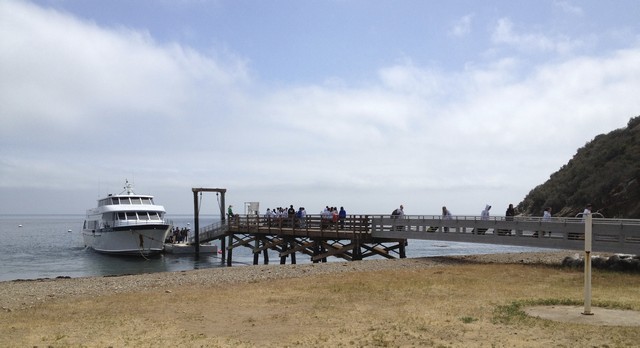 In addition to Catterall, Mount Madonna School faculty members Nate Rockhold and Matt Meachen accompanied the students, and say they enjoyed the CELP-organized activities and time bonding with the students.
In addition to Catterall, Mount Madonna School faculty members Nate Rockhold and Matt Meachen accompanied the students, and say they enjoyed the CELP-organized activities and time bonding with the students.
“I heard kids go from saying ‘I’m not sure I want to do this,’ to not wanting to leave the water by the end of the trip. It was rewarding to see them become inspired and loving the water,” said Rockhold.
“Mostly I enjoyed just playing with the kids and getting to talk about things we don’t get to talk about at school,” shared Meachen.
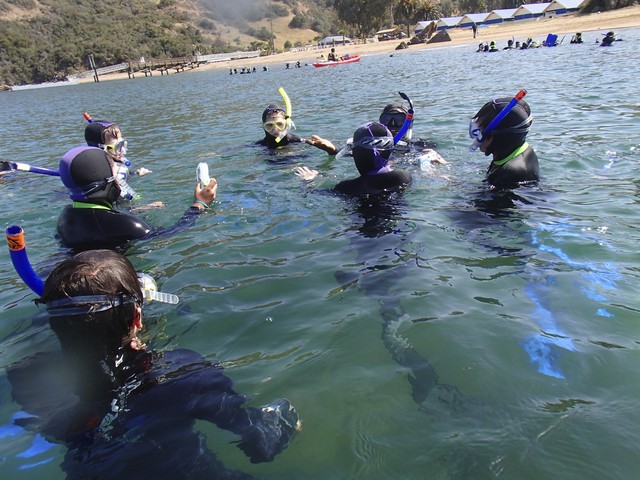 The lab activities that students participated in are accredited as a UC-system elective in Marine Biology; students used a projection digital microscope to examine life from the kelp forest. Students were able to examine animals from six different invertebrate phyla.
The lab activities that students participated in are accredited as a UC-system elective in Marine Biology; students used a projection digital microscope to examine life from the kelp forest. Students were able to examine animals from six different invertebrate phyla.
“We learned about just how many little creatures live in just a tiny bit of seawater,” commented ninth grader Julia Gratton
#####
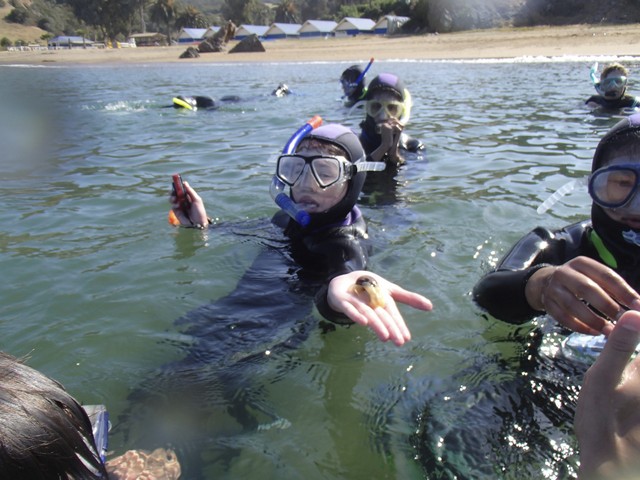
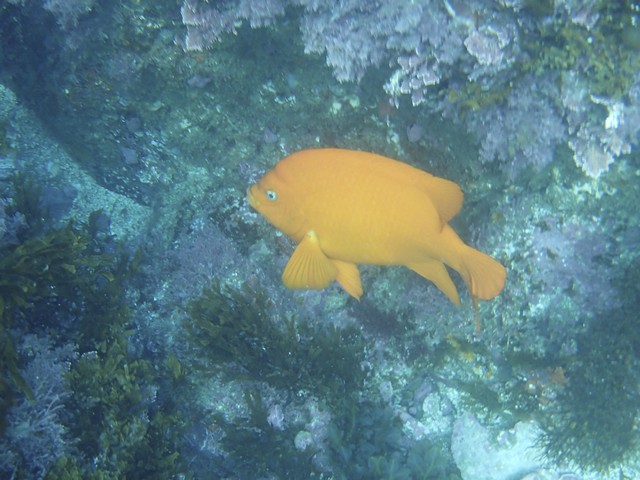
Contact: Leigh Ann Clifton, Media & Public Relations,
Nestled among the redwoods on 355 mountaintop acres, Mount Madonna is a safe and nurturing college-preparatory school that supports students in becoming caring, self-aware and articulate critical thinkers, who are prepared to meet challenges with perseverance, creativity and integrity. The CAIS and WASC accredited program emphasizes academic excellence, creative self-expression and positive character development. Located on Summit Road between Gilroy and Watsonville.
